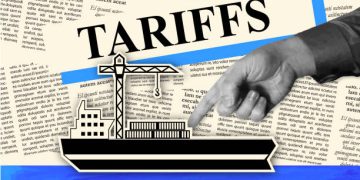Speaking at the Marine Corps Base in Quantico on Tuesday, President Donald Trump once again underscored the central role tariffs play in his administration’s trade and economic policies. He went as far as to describe “tariff” as his favorite word in the English language, calling it the “most beautiful” word and crediting it with making the United States “rich.”
“I love tariffs. My favorite word is tariff. We’re becoming rich as hell because of it,” Trump said during his remarks to the audience, reiterating his long-standing view that tariffs are a tool to strengthen the U.S. economy.
The president argued that for decades, other countries had benefited disproportionately from trade relationships with the U.S., but his use of tariffs has helped restore balance. According to Trump, duties placed on imported goods ensure fairer competition for American industries, create leverage in negotiations, and generate revenue that supports domestic priorities.
A Defining Theme of Trump’s Economic Policy
Tariffs have become a recurring theme in Trump’s trade approach, appearing in multiple policy moves targeting sectors such as timber, steel, furniture, and pharmaceuticals. Supporters argue that tariffs encourage foreign companies to relocate production to the United States, reinforcing domestic manufacturing and supply chains.
Critics, however, caution that tariffs can increase costs for American businesses and consumers by raising the price of imported goods. This has been a particular concern in industries like construction and retail, where reliance on foreign raw materials and finished products remains high. Despite these concerns, Trump has consistently framed tariffs as a bargaining chip that boosts U.S. negotiating power while providing direct economic benefits.
Broader Implications for Trade Relations
Economists note that tariffs remain one of the most debated tools in trade policy. For the U.S., tariff revenue represents only a fraction of total government income, but the political and strategic impact is often more significant than the financial contribution itself. Trump’s comments suggest that tariffs will remain a central element of his economic platform, with further announcements expected across multiple industries in the months ahead.
As the administration continues to expand its tariff agenda, global trading partners are closely monitoring U.S. moves, weighing potential responses while reassessing their own trade strategies. For American companies and consumers, the long-term effects of tariff-driven policies will likely remain a central topic of discussion in both economic and political circles.
#TradePolicy #TariffUpdate #GlobalMarkets #SupplyChainNews #NewsUpdate















